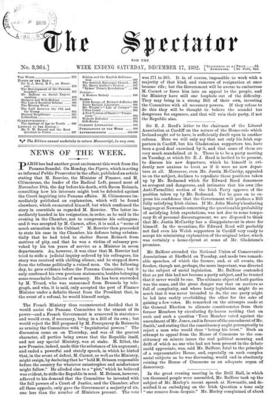Mr. Balfour attended the National Union of Conservative Associations at
Sheffield on Tuesday, and made two remark- able speeches. of which the former, and, at all events, the fresher, though not, perhaps, the more important, was directed to the subject of social legislation. Mr. Balfour contended that as yet this had not become a party subject, and he trusted that it never would be one. The ultimate object of both parties was the same, and the great danger was that on matters so full of complexity, and where hasty legislation might do so much that it was never intended to do, the one party might be led into rashly overbidding the other for the sake of gaining a few votes. He remarked on the attempts made at the General Election to alienate constituencies from their former Members by circulating fly-leaves reciting that on such and such a question Your Member voted against the amendment of Mr. Jones, and in favour of the amendment of Mr. Smith,' and stating that the constituency ought peremptorily to reject a man who would thus " betray his trust." Such an attempt to appeal from the House of Commons to the con- stituency on minute issues the real political meaning and drift of which no one who had not been present in the debate could appreciate, was, said Mr. Balfour, fatal to the principle of a representative House, and, especially on such complex social subjects as he was discussing, would end in absolutely ruining the House of Commons as an adequate organ of democracy.






































